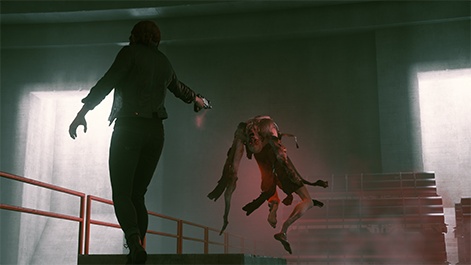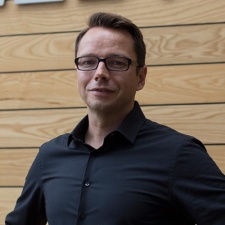Since the early days of Death Rally and Max Payne, Finnish developer Remedy Entertainment has been a beloved name in the games industry. But landscape surrounding the Espoo-based studio has changed and so the company has shifted with it.
Over the last few years, Remedy has moved from being a single-project developer working on big-budget productions like Microsoft's Quantum Break to being a multi-team studio. Recently it's been developing Control - which is set to release today Tuesday, August 27th - alongside Crossfire for Korean firm Smilegate and another game that's in pre-production. Oh, that's on top of its Vanguard skunkworks team, which is investigating more service-based multiplayer-focused projects at the studio.
Speaking to PCGamesInsider.biz at Gamescom 2019, Remedy CEO Tero Virtala - who joined the studio in August 2016 - says that this was partly driven by its staff, but also industry realities.
"It all started with the people; that's always been our driver," he explains.
"We were 130 really ambitious, talented people. When these experienced people say that with this amount of talent we have to be able to do more, that's a basis that people are looking for some change. They're looking for something even more ambitious going into the future. That was the biggest starting point, without knowing yet the direction. We can start thinking about where we should start developing from and know that together with the people, we are able to find the path, they are willing to start the change. That was the fundamental biggest thing - that people came first, that they wanted to do these things.
"Then when we start to get into why, there are things that - yes, we want to continue doing, but take them further and be more ambitious. Control represents how strongly this is gameplay-driven, how much more it can offer for the players compared to our previous games. We want to be more ambitious and take the games in a new direction. Many people would want to do Quantum Break but there are also people that they would like to try something new. A senior programmer maybe wants to be a lead programmer in the next project but when you have this experienced guy above him, if you only have one project, that career path might be blocked. We wanted to be able to provide more for our people and then there definitely was the business part as well. With our level of talent we have, we wanted to be able to grow, be even more successful business-wise in the future and that would then fit more opportunities to put money into our own future productions."

In a way, this is taking Remedy back to its roots. The studio emerged out of Finland's demoscene - developers experimenting with what was possible with 3D graphics in the late 90s, to put it very simply.
"It is in certain senses. Especially now when we are doing more and more games that are really owned, financed and driven by us, not by a publisher, when you combine into that much more professional game development production processes, we are now able to drive these further in a way that we will have a small team that starts the concept phase, prototyping phase and then when the production process is efficient enough when people are needed," Virtala says.
"For Control, our production budget has been between €20m and €30m. When it starts small, it allows the team to ideate and have the creativity but then they also know that in the end, the game needs to sell one-to-two million units to break even, so we can be different, we can use the creativity, we don't need to consider in the early phase that this needs to sell a minimum of five million copies. This combination of starting with small teams, expanding and not doing the biggest productions in the world, those give the basis to really be creative."
For Control, our production budget has been between €20m and €30m. When it starts small, it allows the team to ideate and have the creativity
When a company shifts from doing one thing or project at a time to diversifying - as Remedy is doing - often it is to do with lessons learnt from the firm's last project. Asked what the studio learnt from 2016's Microsoft-published Quantum Break, Virtala says one thing Remedy is trying to do now is working on shorter development cycles and limiting the scope of a project early on via prototyping.
"When we start with small teams and start creating the ideas, innovate the concept, have the early designs, we start prototyping, we have the world, we have the characters, we have the main storylines, then we have the expanded gameplay systems," he says, "but of course, you need to be scoping the game at certain points, you get a new idea that will expand the game; these are all possibilities but typically, you shouldn't try and fit everything into one game because you want it to be ready in three years time. For a game to be really good, it needs to have a certain focus.
"There are a lot of these ideas and concepts - some people love one, others love another. Now with the multiple projects, they are all still based on our core strength. When we have multiple projects, people have these options to utilise ideas where maybe one idea wasn't used in a previous project but it might be wise to use it in another one. This type of possibilities opens up also when we have multiple projects running."
The first project to come out of the new Remedy is Control published by 505 Games. Given the changes the studio has made over the past few years, we have to ask: how much is there to read into this game's name?
"I didn't think about the name," Virtala laughs.
"Definitely there are some similarities. Control as a game is not affected, at least not intentionally, by our will to have more control of our own future. We give a lot of trust and freedom to our creative minds, so maybe it's true that they've decided there is a clear link."

And speaking of the notion of Remedy taking Control, the studio recently acquired the publishing rights to its beloved Alan Wake from Microsoft for an undisclosed sum.
"Alan Wake has been an important game for us. There are still quite a lot of fans out there who remember the game and there are a lot of developers still at Remedy who were part of creating Alan Wake," Virtala said.
"That game has a special place in Remedy's heart. It has always been a brand IP owned by us, but of course, Microsoft was an important part with whom we were doing the game. The publishing rights had of course been with Microsoft as the publisher, but nothing has happened with Alan Wake. We have really good relationships with a number of publishers and platform holders. When we have been developing as a company, who knows what the future holds. Alan Wake is important to us. It's our brand so I think it clarifies the situation that now the publishing rights have reverted back to us."
Of the many teams at Remedy, Vanguard is the one that holds a certain fascination. We know roughly what a regular Remedy game is going to be - a single-player experience with a focus on narrative and action gameplay with a supernatural element to it. But as for what a multiplayer and games-as-a-service Remedy project would look like... that's something entirely new.
"There has always been a group of people who are saying that they like multiplayer games, the industry is developing into a direction that places multiplayer in a bigger and bigger role, yes, there is a huge market for high-quality single-player games, but still there are people who have been interested in that," Virtala explains.
"Now, when we've been developing as a company, one of these strategic pillars has been the multi-project organisation. It was the end of 2018, we started to be in a phase when the improvement needs never end, but we have been able to build the organisation into a phase where we had two bigger productions on-going, we had the technology team, we were able to start with really small teams, some new initiatives. There were some people who were very interested and trying to figure out if we are able to utilise our core strengths of world-building and characters and some of the elements of story-building into longer-term games-as-a-service multiplayer. It's been in a prototyping phase."
He concludes: "It's been a really interesting development but it's still a small team in a very early phase. Let's see where it ends up."
















